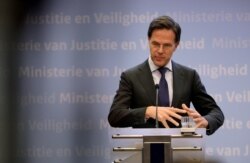Netherlands Prime Minister Mark Rutte announced Tuesday the government is extending its COVID-19 restrictions by three weeks, to February 9, expressing concern about the new so-called “British variant” of the virus.
At a televised news conference in The Hague, Rutte said he was certain the news was no surprise and that most people would understand there was no choice but to extend the pandemic-related restrictions, which had been scheduled to expire January 19.
Rutte said reports about the spread of the variant, identified last month in Britain, were “alarming.” The variant has been shown to spread more easily than the original form of the virus, though it is not been found to cause a more severe infection.
Under the current restrictions, the toughest yet imposed in the nation, schools and nonessential businesses have been closed, and people are banned from having more than two people in their homes. There are limits on the size of outdoor gatherings, as well, and Rutte said they were considering imposing an evening curfew.
COVID-19 infection rates had started to drop in recent weeks following the start of the lockdown last month. But health officials say daily rates are still too high. According to the Johns Hopkins Coronavirus Resource Center, the Netherlands have had a total of 890,000 cases and 12,512 deaths from the virus.
The Netherlands rolled out its initial vaccination program last Wednesday, the last nation in the European Union to do so.






